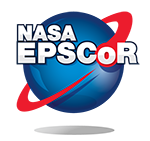NASA Kentucky EPSCoR Program

About Kentucky’s NASA EPSCoR Program
Kentucky’s NASA EPSCoR Program provides funding and support for NASA-related research projects within the state. Any Kentucky institution of higher learning is eligible to apply.
Current Funding Opportunities:
RFI-25-003: NASA KY EPSCoR ISS Flight Opportunity (pdf) OPEN
RFP-23-001: NASA KY EPSCoR Faculty Research Travel Opportunity (RT) (pdf) OPEN
Recent Opportunities:
RFP-25-002: NASA KY EPSCoR Research Infrastructure Development (RID) (pdf) CLOSED
RFP-24-004: NASA KY EPSCoR Research Award (RA) Pre-Proposals 2024 (pdf) CLOSED
NASA Kentucky EPSCoR Program
The NASA KY EPSCoR (Established Program to Stimulate Competitive Research) programs strengthen research capability in the state in areas of importance to NASA and Kentucky by promoting development of research infrastructure, improving capabilities to gain support outside of EPSCoR, and developing partnerships with NASA.
Proposal Resources:
* FY25 RA Research Topics *
* FY25 R3 Research Focus Areas *
NASA Center Core Competencies
NASA Technology Taxonomy
NASA TECHPORT Research Summaries
NASA STI
NASA GCAM Grants Manual 2025 (pdf)
NASA Grants Policies
NASA KY Recent Projects 2016-2024 (pdf)
NASA KY FAQ
NASA Kentucky EPSCoR supports faculty research development with these programs:
- RA – NASA EPSCoR Research Award (Basic Research)
- R3 – Rapid Response Research
- ISS – ISS Flight Opportunities
- SFO – Suborbital Flight Opportunities
- RIDG – Research Infrastructure Development
- WCS – Workshop/Conference/Seminar
- RT – Faculty Research Travel Awards
Please see recent RFPs for full program descriptions
Eligibility for NASA EPSCoR Programs:
Proposals will be accepted from institutions of higher education in Kentucky. Eligibility is not limited to Kentucky Space Grant Consortium Affiliate Institutions. US Citizenship is not required, but funded investigators must be eligible for employment in the US. Reporting on current and prior awards must be up to date to be eligible for funding. Kentucky commmercial, non-profit, and government entities can partner with KY academic institutions for proposals.
Reporting Requirements:
NASA KY will provide Principal Investigators (PIs) with a reporting template for each award. PIs are required to report research productivity and students supported via: 1) Progress reports during the award period, 2) Final Report within 30 days of the end of the award, and 3) Post-award annual update 1 year after project completion. Reporting must be current in order for NASA KY to meet NASA and state annual report cycles. Project reports should be submitted to nasa@uky.edu.
NASA EPSCoR Research Award (RA) Program
In addition to the programs above, NASA Kentucky solicits pre-proposals annually and competitively selects one for development into a full proposal to submit to the national NASA EPSCoR Research opportunity.
RFP-24-004: NASA KY EPSCoR Research Award (RA) Pre-Proposals 2024 (pdf) CLOSED
The NASA Office of STEM Engagement (OSTEM), in cooperation with NASA Mission Directorates and ten Centers, solicits proposals for the NASA Established Program to Stimulate Competitive Research (EPSCoR) Basic Research award program. Each funded NASA EPSCoR Basic Research proposal is expected to establish research activities that will make significant contributions to the strategic research and technology development priorities of one or more of the Mission Directorates and contribute to the overall research infrastructure, science and technology capabilities, higher education, and economic development of the jurisdiction (Kentucky).
